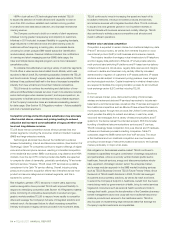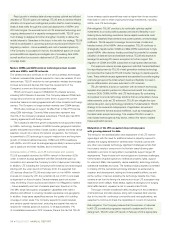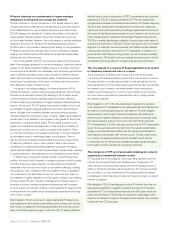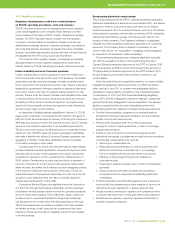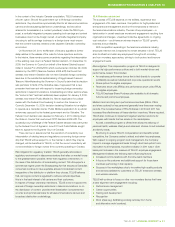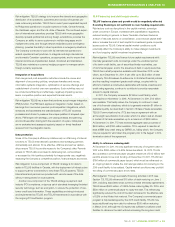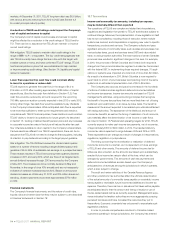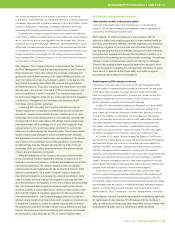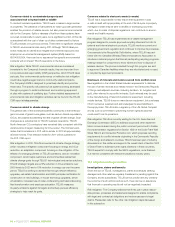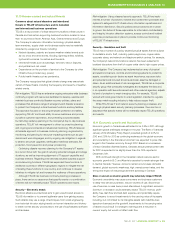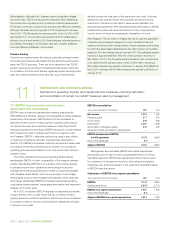Telus 2011 Annual Report Download - page 96
Download and view the complete annual report
Please find page 96 of the 2011 Telus annual report below. You can navigate through the pages in the report by either clicking on the pages listed below, or by using the keyword search tool below to find specific information within the annual report.
92 . TELUS 2011 ANNUAL REPORT
Collective bargaining
In June 2011, the membership of the Telecommunications Workers Union
ratified a new collective agreement, which came into effect on June 9 and
will expire at the end of 2015. The agreement includes wage increases
of 1.5% on July 1, 2011, 2.0% on July 1, 2012, 2013 and 2014, and 2.5%
on July 1, 2015. Also included is a cost of living adjustment provision of up
to 1% on January 1, 2015, activated only if the Canada-wide consumer
price index exceeds 3%. This agreement covers approximately 11,250
active members at December 31, 2011.
The collective agreement between TELUS and the Syndicat des
agents de maîtrise de TELUS (SAMT), which covers approximately 510
professional and supervisory employees in the TELUS Quebec oper-
ating region, expired on December 31, 2011. Negotiations to renew this
contract began in October 2011. In any set of labour negotiations,
there can be no assurance that the negotiated compensation expenses
or changes to operating efficiency will be as planned and may result
in unanticipated increased costs and/or reduced productivity. In addition,
there can be no assurance that reduced productivity and work dis-
ruptions will not occur during the course of collective bargaining prior
to settlement and ratification.
Risk mitigation: A governance model is in place to ensure the financial
and operating impact of any proposed terms of settlement are assessed
and determined to be aligned with TELUS’ strategic direction. Any poten-
tial need to continue operations in response to work disruptions has
been addressed through extensive contingency planning and emergency
operations plans. Though the Company has built and validated emergency
operations plans, there can be no assurance that all potential issues
have been planned for or that the contingencies planned for will manifest
in exactly the same fashion as tested. As a result, there is risk that
increased costs or disruptions may still occur.
10.5 Process risks
Systems and processes
TELUS has numerous complex systems and process change initiatives
underway. There can be no assurance that the full complement of the
Company’s various systems and process change initiatives, including
those required to support changes in provincial sales tax regimes, will
be successfully implemented or that sufficiently skilled resources will
be available to complete all key initiatives planned for 2012 and beyond.
There is risk that certain projects may be deferred or cancelled and
the expected benefits of such projects may be deferred or unrealized.
Risk mitigation: In general, TELUS strives to ensure that system
development priorities are selected in an optimal manner. TELUS’ project
management approach includes extensive risk identification and con-
tingency planning, scope and change control, and resource and quality
management. The quality assurance of the solutions includes extensive
functional, performance and revenue assurance testing, as well as
capturing and utilizing lessons learned. In addition, TELUS often moves
its business continuity planning and emergency management oper-
ations centre to a heightened state of readiness in advance of major
systems conversions.
Large enterprise deals
TELUS’ operating efficiency and earnings may be negatively impacted
by challenges with (or ineffective) implementation of large enterprise
deals,
which may be characterized by service credits that lower revenues,
significant upfront expenses and capital expenditures, and a need to
anticipate, understand and respond to complex and multi-faceted enter-
prise customer-specific requirements and stakeholders. There can be
no assurance that service implementation will proceed as planned and
expected efficiencies will be achieved, which may impact return on
investment or desired margins. The Company may also be constrained
by available staff, system resources and co-operation of existing service
providers, which may limit the number of large contracts that can be
implemented concurrently in a given period and/or increase the cost to
TELUS related to such implementations.
Risk mitigation: TELUS has gained experience in implementing numerous
large enterprise deals over a number of years and expects to continue
to focus on implementing recent large enterprise contract wins. In addition,
the Company expects to continue being selective as to which new large
contracts it will bid on and to continue its focus on the SMB market.
TELUS continues to realize the benefits of implementing internal
reorganizations, including the consolidation of functions such as
Technology Strategy and Technology Operations, as well as the con-
solidation of certain other functions. The expected benefits include
streamlined operations, more effective deployment of technologies and
supporting systems, cost efficiencies, improved customer service, and
better capability to implement large enterprise deals. TELUS follows
industry standard practices for rigorous project management, including
executive (senior) level governance and project oversight; appropriate
project resources, tools and supporting processes; and proactive
project-specific risk assessments and risk mitigation planning. TELUS
also conducts independent project reviews and internal audits to help
monitor progress and identify areas that may require additional focus,
and to identify systemic issues and learn ings in project implementations
which may be shared among projects.
Reorganizations
Arising from its operating efficiency program, the Company carries out
a number of operational consolidation, rationalization and integration
initiatives each year that are aimed at improving the Company’s operating
productivity and competitiveness. There can be no assurance that all
planned efficiency initiatives will be completed, or that such initiatives
will provide the expected benefits or will not have a negative impact on
operating performance, employee engagement, financial results and
customer service.
Risk mitigation: TELUS focuses on and manages organizational changes
through a formalized business transformation function by leveraging the
expertise, key learnings and best practices gained from mergers, business
integrations and efficiency-related reorganizations in recent years.
Foreign operations
Maintaining TELUS’ international operations presents unique risks,
including country-specific risks (such as differences in political, legal
and
regulatory regimes and cultural values), lack of diversity in geo graphical
locations, concentration of customers, different taxation regimes, infra-
structure and security challenges, differences in exposure to and frequency
of natural disasters, and the requirement for system processes that
work across multiple time zones, cultures and countries. There can be
no assurance that international initiatives and risk mitiga tion efforts will
provide the benefits and efficiencies expected, or that there will not
be significant difficulties in combining different management and cultures,
which could have a negative impact on operating and financial results.




